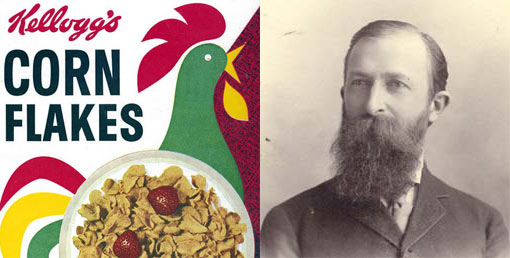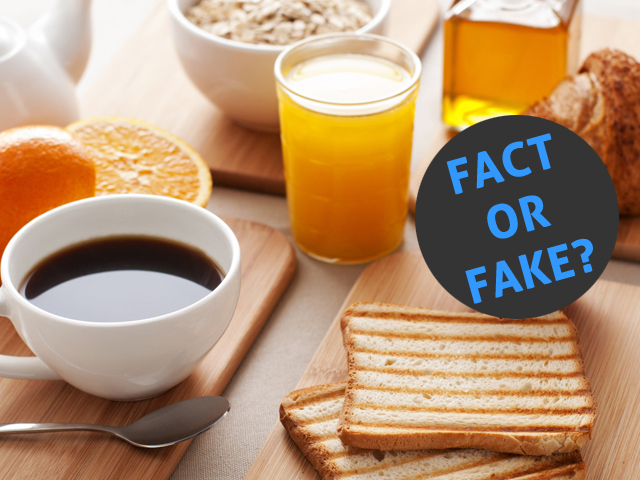Is Breakfast Really The Most Important Meal Of The Day?
— FACT OR FAKE?
Breakfast, which literally refers to breaking the fasting period of the prior night, is the first meal consumed after rising from a night's sleep. As the topic's Wikipedia entry notes, it is most often eaten in the early morning before undertaking the day's work.
A mixture of Indian food (naan and curry) and Chinese food (noodles) for breakfast
Image via taichungscott.blogspot.comThe first meal of the day can have a very different meaning for different people.
cnn.comFor some, it's grabbing a granola bar to nibble on during the morning commute; for others, it includes a big omelet with a cup of coffee at home.
cnn.comThen there are the millions who forego grub in the a.m. altogether.
cnn.comReferred to as the most important meal of the day, it has been claimed that people who skip breakfast are disproportionately likely to have problems with concentration, metabolism, weight, cardiac health, diabetes as well as coronary disease, etc.
So much of what we think we know about breakfast boils down to the age-old assumption that it's the most important meal of the day. But chances are, the origins of the phrase -- or dare we say breakfast's entire reputation -- come from a surprising place.
"[I]n many ways, the breakfast is the most important meal of the day, because it is the meal that gets the day started," Lenna F. Cooper, B.S., writes in a 1917 issue of Good Health, the self-proclaimed "oldest health magazine in the world" edited by none other than Dr. John Harvey Kellogg, the co-inventor of flaked cereal.
"It should not be eaten hurriedly, and all the family, so far as possible, should partake of it together. And above all, it should be made up of easily digested foods, and balanced in such a way that the various food elements are present in the right proportions. It should not be a heavy meal, consisting of over five to seven hundred calories," Cooper's article continues.
But scientific support for that idea - that breakfast is the most important meal of the day - has been surprisingly meager, and, as per The New York Times, a spate of new research at several different universities could change the way we think about it
While breakfast has been eaten for ages, according to the author of 'Breakfast: A History', it was once associated with gluttony
"It was actually socially and morally frowned upon to eat breakfast until about the 17th century, with the reformation of the church," Heather Arndt Anderson, a Portland, Oregon-based plant ecologist and food writer and the author of Breakfast: A History, tells The Huffington Post.
Queen Elizabeth was also a breakfast eater, which helped the morning meal become gradually more acceptable throughout Europe, where chocolate, coffee and tea were simultaneously growing in popularity, she says.
With the Industrial Revolution came a drop in how much energy people needed to complete their daily tasks, says Arndt Anderson, but they were still eating "whatever they could find" for breakfast, whether it was last night's leftovers or just some bread and cheese.
Proponents of a lighter breakfast -- like John Harvey Kellogg and his brother and co-inventor Will Keith -- argued for vegetarian meals and whole grains, and believed these foods were better not just for the body, but the spirit and the soul, says Arndt Anderson.
So what's the deal with it? With nutrition science as a field bisected over the importance of breakfast, how much truth does the statement that it's the most important meal of the day hold?
According to a nutrition and obesity research scientist at the University of Alabama Birmingham, Andrew Brown, Ph.D., we may be over-extending the findings of pro-breakfast studies
Andrew Brown, Ph.D., a nutrition and obesity research scientist at the University of Alabama Birmingham
Image via andrewbrownphd.comIn a 2013 review of the existing research, Brown and his colleagues couldn't find a causal link between breakfast habits and obesity, but noted that research boasting potential weight loss benefits from eating breakfast remains in good favor.
"What all this tells me is kind of twofold," he tells The Huffington Post. "One is that either we don't know what it is about a particular breakfast that could influence weight, so we haven't collectively done the right study yet, but also that some of these things we like to just state and perpetuate can go quite a ways beyond what the evidence shows."
This doesn't mean the end of breakfast, however. If the analysis of the literature had found that fruits and veggies weren't as powerful as we once thought, we wouldn't suddenly recommend avoiding produce, he says. But at the very least, maybe we can stop belittling those people who feel a true aversion to eating in the morning, he says.
"[E]specially in terms of obesity, these effects might be more preventative than treatment, because short-term clinical trials in already obese adults have not shown much of a weight loss benefit from eating breakfast as compared to skipping breakfast," Cahill writes. "We need long-term clinical trials."
In one study, published in The American Journal of Clinical Nutrition, 300 people ate or skipped breakfast and showed no subsequent difference in their weight gained or lost
The largest and most provocative of the studies focused on whether breakfast plays a role in weight loss. Researchers at the University of Alabama at Birmingham and other institutions recruited nearly 300 volunteers who were trying to lose weight
They randomly assigned subjects to either skip breakfast, always eat the meal or continue with their current dietary habits. (Each group contained people who habitually ate or skipped breakfast at the start, so some changed habits, and others did not.)
Sixteen weeks later, the volunteers returned to the lab to be weighed. No one had lost much, only a pound or so per person, with weight in all groups unaffected by whether someone ate breakfast or skipped it.
In another study from the University of Bath, people's cholesterol levels, resting metabolic rates, and overall blood-sugar levels were unchanged after six weeks of foregoing breakfast
In another new study — this one of lean volunteers — researchers at the University of Bath determined the resting metabolic rates, cholesterol levels and blood-sugar profiles of 33 participants and randomly assigned them to eat or skip breakfast. Volunteers were then provided with activity monitors.
After six weeks, their body weights, resting metabolic rates, cholesterol and most measures of blood sugar were about the same as they had been at the start, whether people ate breakfast or not. The one difference was that the breakfast eaters seemed to move around more during the morning; their activity monitors showed that volunteers in this group burned almost 500 calories more in light-intensity movement.
But by eating breakfast, they also consumed an additional 500 calories each day. Contrary to popular belief, skipping breakfast had not driven volunteers to wolf down enormous lunches and dinners — but it had made them somewhat more sluggish first thing in the morning.
Together, The New York Times notes, the new research suggests that in terms of weight loss, "breakfast may be just another meal"
Skipping breakfast in these studies did not fatten people, said Emily Dhurandhar, the assistant professor at the University of Alabama at Birmingham who led the study there. Each study was fairly short-term, however, and involved a limited range of volunteers.
More randomized experiments are needed before we can fully understand the impact of breakfast, said James Betts, the professor who led the study of lean people. It’s not yet clear, for instance, whether heavy people’s bodies respond differently to morning meals than lean people’s, or if the timing and makeup of breakfast matters.
“I almost never have breakfast,” Dr. Betts said. “That was part of my motivation for conducting this research, as everybody was always telling me off and saying I should know better.” Based on the results of these studies, he said his habits won’t change.
Neither will those of Dr. Dhurandhar, who enjoys a morning meal. But, she said, “I guess I won’t nag my husband to eat breakfast anymore.”
FAKE: Based on the above given references of the studies conducted on having or skipping breakfast, it is safe to say that "NO, a breakfast is not the most important meal of the day." The bottom line is "if you like breakfast, fine; but if not, don't sweat it."
The curator of this column's reaction right now: "Oh, boy. This makes me so. much. happy."
Image via blogspot.comBut for those who are not satisfied with the shades of grey, like the health writer for The Atlantic, let's say there are two kinds of people in the world: those who eat breakfast, and those who don't
If you're a breakfast deferrer who feels cowed by breakfast evangelists, a good way to stand up to them might be to echo Betts: "More randomized experiments are needed before we can fully understand the impact of breakfast."
Or as a joke, "If you like breakfast so much, why don't you marry it?" Or, with a very serious face, "Don't tell me how to live my life."






